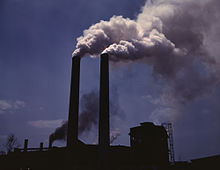economic libertarians
The Libertarian Critique of Trump’s “Schedule F”
As it turns out, you can hate BOTH government regulation and Trump’s assault on the “deep state.”
Installing inexperienced ideologues in the executive branch won’t accomplish anything useful and would only make it harder to implement deregulatory policies. The main effect of Schedule F would be gridlock rather than policy change
CONTINUE READINGThe Epstein Affair
A prominent law prof got COVID-19 numbers disastrously wrong. Then things got worse.
The New Yorker recently published a devastating interview with law professor Richard Epstein. He had attracted their notice by publishing two columns on the Hoover Institution website, the first projecting a total of 500 U.S. deaths from the coronavirus (later raised to 5000), and the second defending his work. I don’t see any need to …
Continue reading “The Epstein Affair”
CONTINUE READINGCarbon Vouchers: A Small-Government Approach to Climate Action
How to limit climate change without giving the Feds enforcement powers or revenue.
What I’m going to sketch here isn’t a zero government approach. But the government’s role is very limited: federal agencies don’t do any enforcement and the government doesn’t touch any revenue from the scheme. So this approach deals with the concern that a carbon tax or something similar would either expand EPA’s ability to abuse …
Continue reading “Carbon Vouchers: A Small-Government Approach to Climate Action”
CONTINUE READINGLightbulb Wars : The Saga Continues
Republicans win a largely symbolic victory for an obsolete technology.
Among the sleeper provisions of the new budget deal is a ban on enforcing federal lightbulb standards. This is a great example of symbolic politics — it makes Tea Party Republicans happy, has limited practical effect, and makes little policy sense. Or to put it another way, the enforcement ban is a dumb thing to …
Continue reading “Lightbulb Wars : The Saga Continues”
CONTINUE READINGWhy Pollution Regulations Aren’t Taxes
Opponents of environmental regulations love to call them hidden taxes. But constant repetition doesn’t make this idea true.
If you’ve seen a statement that regulations are hidden taxes, that’s not too surprising. Googling “regulation hidden taxes” produces over three million hits. But in fact, pollution regulations and taxes are completely different. The reason is simple. A tax removes value from the private sector. Environmental regulations simultaneously remove value from one part of …
Continue reading “Why Pollution Regulations Aren’t Taxes”
CONTINUE READINGRon Paul: The Most Anti-Environmental Candidate Ever
We already tried Ron Paul’s environmental approach, and it didn’t work. This is more or less where the law stood fifty years ago. The result then was massive air and water pollution, and that’s where Ron Paul would take us back to.
CONTINUE READINGWhy Economists Are Right and the Tea Party is Wrong About Government
The idea that the government should protect public goods and regulate externalities is just common sense.As I said earlier, economists tend to be fairly hard-nosed in applying these arguments, and they tend to favor cap-and-trade or pollution taxes more than conventional regulation. They also tend (in the view of some of us) to undervalue economic benefits and shortchange long-term human interests. But it would be hard to find a reputable economist, for example, who thinks we should do nothing about climate change, although there’s plenty of disagreement about how much we should do and how quickly.
CONTINUE READING






